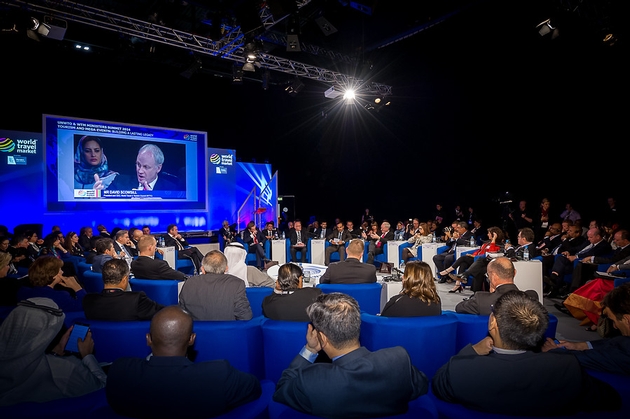Participants at the UNWTO & WTM Ministers’ Summit stressed that “immense synergies” between mega-events and tourism should be used to generate long-time benefits for the destination and its people.
Opening the Summit, UNWTO Secretary-General, Taleb Rifai, said “Destinations need to consider infrastructure, investment and jobs, intangible benefits such as how the country is perceived and the most effective way to involve the community when looking at the legacy of mega-events.”
In terms of infrastructure, one benefit of Brazil’s hosting of the FIFA World Cup 2014 was that its airports are now privatized. Brazil’s Vice-Minister of Tourism, Vinícius Lemmertz, said: “The World Cup set the agenda for public-private cooperation.”
The positive employment legacy of London 2012 was mentioned by VisitBritain Chairman Christopher Rodrigues while China National Tourism Administration, Vice Chairman Jiang Du highlighted the role of volunteers “We were able to engage students, young people, people who had retired. Volunteer work is now routine across all our mega-events.”
Intangible benefits are less obvious, but equally important, said Mr. Rifai. His views were supported by the South Africa Minister of Tourism, Derek Hanekon. “We hosted the Rugby World Cup in 1995 on the back of nothing, he said, “and it showed the world our capability,” he said.
During the panel discussion, moderated by CNN International’s Max Foster, a number of other points were raised. While mega-event discussions tend to concentrate around sports, Saudi Arabia Vice President for Marketing & Programs, Saudi Commission for Tourism and Antiquities, Hamad A. Al-Sheikh, pointed out that the yearly Hajj pilgrimage, which can attract three million people over five days, “is the biggest and oldest event in the world.”
At the other end, Tunisia is seeing the benefits from helping smaller events to become financially sustainable. Tunisia Minister of Tourism, Amel Karboul, said “There needs to be a new definition of mega,” she suggested. “Even if you have three people turn up to a festival you can still get five million people talking about it on social media.”
This same opinion was echoed by the Minister of Tourism and Entertainment of Jamaica, Wykeham McNeill, and by the Minister of Tourism of Lebanon, Michel Pharaon, who said “Not all countries can host mega-events yet cultural events are key to promote the country and bring different people together”.
Isabel Borrego, Secretary of State for Tourism, Spain stressed that when bidding to host a mega event “it is fundamental to evaluate properly its impacts and sustainability”.
David Scowsill, President and CEO, World Travel & Tourism Council (WTTC), called for the engagement of the private sector in the early stages of the preparation of any mega-event bid and Adolfo Mesquita Nunes, Secretary of State for Tourism, Portugal, stressed that tourism administrations need to be “involved from the beginning in any hosting of mega-events” but remain cautious that the decision of bidding to host such events must be totally “in line with the main objectives of a country”.
The Chairman of the Qatar Tourism Authority, Issa Mohammed Al Mohannadi, stressed that the infrastructure development for the forthcoming Football World Cup is being planned according to its future use.
World Travel Market Senior Director Simon Press said: “This is the eighth time WTM and UNWTO has hosted the Ministers’ Summit and every year we are able to provide ministers and delegates with a forum to discuss the big issues impacting the global tourism business.
“Mega-events and tourism go hand in hand, but as we heard today, the learnings from mega-events can also help destinations to make the most of smaller events.” Mr. Rifai added: “The debate covered many areas we expected, but also brought up some new insights and experiences which we are delighted to bring into the conversation.
Participating in the summit were also Hiromi Tagawa, Chairman of Japan Association of Travel Agents (JATA), Alan Gilpin, Head of the Rugby World Cup at the International Rugby Board (IRB), and Thomas Waldner from the Donauinselfest in Austria.
– ENDS –
About World Travel Market
World Travel Market, the leading global event for the travel industry, is the must-attend four-day business-to-business exhibition for the worldwide travel and tourism industry.
More than 50,000 senior travel industry professionals, government ministers and international press, embark on ExCeL – London every November to network, negotiate and discover the latest industry opinion and trends at WTM.
WTM, now in its 35th year, is the event where the travel industry conducts and concludes its deals.
WTM 2013 generated more than £2 billion of travel industry contracts, revealed independent research by Fusion Communications.
WTM is owned by the world’s leading events organiser Reed Exhibitions (RE), which organises a other portfolio’s of travel industry events including IBTM Events, the world’s leading showcases for the meetings and events industry and International Luxury Travel Market events.
In 2013, RE held more than 500 events in 40 countries bringing together more than six million people from around the world generating billions of dollars in business.
Reed Exhibitions
Reed Travel Exhibitions (RTE) is the world’s leading provider of exhibitions in the travel and tourism industry, with a wide-ranging portfolio of 21 international events in 14 countries throughout the Americas, Europe, the Middle East, Asia Pacific and Africa.
Its market-leading, business-to-business events cover all elements of travel and tourism, including leisure travel, luxury travel, meetings, events, incentives and business travel, as well as golf, ski and spa travel.
RTE is part of Reed Exhibitions.
www.reedtravelexhibitions.com


